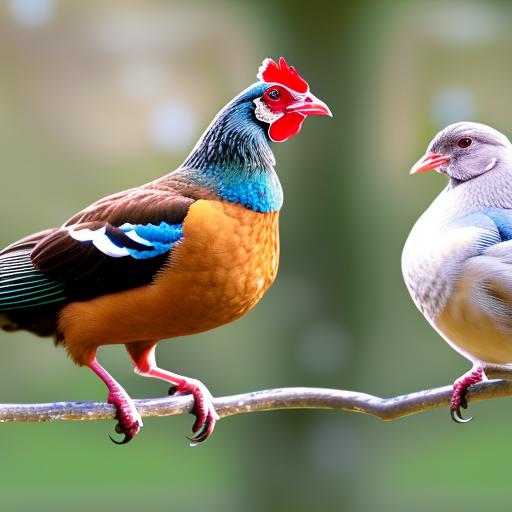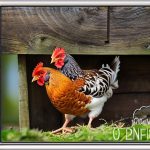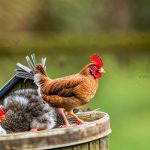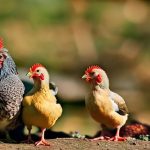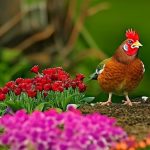Keeping birds with chickens can be a fun and rewarding experience for backyard farmers. Not only do birds provide additional pest control by eating insects and other small pests, but they also add entertainment and diversity to the flock. In this blog post, we’ll explore the different types of birds that can be kept with chickens, housing requirements, feeding and watering tips, and more.
Key Takeaways
- Keeping birds with chickens can provide numerous benefits
- Different types of birds can be kept with chickens, but it’s important to choose the right ones
- Proper housing requirements are necessary for both birds and chickens
- Feeding and watering both birds and chickens together requires careful management
- Preventing the spread of disease is crucial for the health of the flock.
Types of Birds That Can Be Kept with Chickens
There are several types of birds that can be kept with chickens. Ducks, geese, and turkeys are popular choices for backyard farmers. Ducks are known for their ability to eat slugs, snails, and other pests that can harm your garden. Geese are excellent at keeping the grass trimmed and can also act as a deterrent to predators due to their loud honking. Turkeys are great foragers and can help keep the area around the coop clean.
Quails and guinea fowl can also be kept with chickens. Quails are small birds that are known for their delicious eggs. They require less space than ducks or geese and can be a great addition to your flock if you have limited space. Guinea fowl are excellent at controlling ticks and other pests in your yard. They are also known for their loud alarm calls, which can help alert you to potential predators.
Before introducing any new bird species to your flock, it’s important to research their specific needs and behaviors. Some birds may be too aggressive or territorial to be kept with chickens, while others may have specific dietary requirements that need to be met.
The Importance of Choosing the Right Bird
When choosing birds to keep with your chickens, it’s important to consider their size and temperament. Birds that are similar in size and temperament are more likely to get along with each other and less likely to cause conflicts within the flock. For example, if you have a small flock of chickens, it may be best to choose smaller bird species like quails or guinea fowl.
It’s also important to consider the space and resources available for the birds. Each bird species will have different space requirements and may need their own separate sleeping areas. Providing enough space and resources for all the birds in your flock will help prevent aggression and ensure that each bird has access to food, water, and shelter.
Housing Requirements for Birds and Chickens
Birds and chickens should have separate sleeping areas to prevent fighting. This can be achieved by providing separate coops or by partitioning off a section of the coop for the birds. Coops should be large enough to accommodate all birds and provide adequate ventilation to prevent the buildup of ammonia from their droppings.
Nesting boxes should be provided for each bird species. Chickens typically lay their eggs in nesting boxes, while ducks and geese prefer to lay their eggs on the ground. Quails require smaller nesting boxes with low sides, while guinea fowl prefer to nest in tall grass or shrubs. Providing appropriate nesting areas for each bird species will help ensure that they feel safe and comfortable when laying their eggs.
Building a Coop: Tips and Tricks
When building a coop for birds and chickens, it’s important to consider the specific needs of each bird species. For example, ducks and geese require access to water for swimming, so you may need to include a small pond or pool in their section of the coop. Quails require smaller perches and nesting boxes, while guinea fowl prefer roosting in trees or tall structures.
Adding perches and nesting boxes can help create a comfortable living space for all birds. Chickens typically prefer perches that are higher off the ground, while ducks and geese prefer lower perches or platforms. Providing multiple perches at different heights will allow each bird species to find a comfortable spot to rest.
Feeding and Watering Birds and Chickens Together

Birds and chickens can be fed the same type of feed, but it’s important to monitor their intake. Some bird species may require additional supplements or specific types of feed to meet their nutritional needs. It’s also important to provide separate feeding and watering stations to prevent competition. Birds and chickens have different feeding behaviors, and allowing them to eat separately will help ensure that each bird gets enough food.
Fresh water should be available at all times for both birds and chickens. Ducks and geese require access to water for swimming and cleaning their feathers, so a small pond or pool should be provided in their section of the coop. Quails and guinea fowl can drink from regular waterers, but it’s important to ensure that the water is clean and free from contaminants.
Keeping the Peace: Tips for Managing Flock Dynamics
Introducing new birds slowly and gradually can help prevent conflicts within the flock. Birds are territorial animals, and introducing new birds too quickly can lead to aggression and fighting. It’s best to introduce new birds in a separate area adjacent to the main coop, allowing them to see and interact with each other without direct contact. After a period of time, they can be gradually integrated into the main flock.
Providing plenty of space and resources can also help reduce aggression within the flock. Birds that have enough space to roam and access to food, water, and shelter are less likely to become aggressive towards each other. It’s important to monitor the flock regularly for signs of bullying or injury, and take appropriate action if necessary.
Health Concerns: Preventing the Spread of Disease
Birds and chickens can carry different diseases, so it’s important to keep them separate when necessary. Some diseases can be transmitted between bird species, while others are specific to certain species. Regular cleaning and disinfecting of the coop can help prevent the spread of disease. It’s also important to quarantine new birds before introducing them to the flock to ensure that they are healthy and free from any contagious diseases.
Egg Laying: How Birds and Chickens Can Benefit Each Other
Birds and chickens can lay eggs together in the same nesting boxes. This can add variety to your egg collection, as different bird species lay eggs of different sizes and colors. Some bird species, like ducks, can even help fertilize chicken eggs. If you’re interested in hatching your own chicks, you can collect duck eggs and place them under a broody chicken to be incubated.
The Joys of Keeping Birds and Chickens Together
Keeping birds with chickens can be a fun and rewarding experience for backyard farmers. By choosing the right birds, providing adequate housing and resources, and monitoring flock dynamics, you can create a harmonious living environment for all your feathered friends. Not only will they provide additional pest control and entertainment for your flock, but they will also add diversity to your egg collection. So why not consider adding some birds to your chicken flock? You won’t be disappointed!
If you’re interested in learning more about birds that are related to chickens, you might find this article on Poultry Wizard quite fascinating. It explores the question of whether geese can eat chicken feed. To find out if these feathered friends can share the same diet, check out the article here: Can Geese Eat Chicken Feed?
FAQs
What are some birds that can be kept with chickens?
Some birds that can be kept with chickens include ducks, geese, turkeys, and quails.
What are the benefits of keeping different birds together?
Keeping different birds together can provide a variety of benefits such as increased protection against predators, improved foraging and grazing, and better socialization for the birds.
What are some things to consider before keeping different birds together?
Before keeping different birds together, it is important to consider their size, temperament, and dietary needs. It is also important to ensure that the housing and living conditions are suitable for all the birds.
Can different birds share the same feed?
While some birds may be able to share the same feed, it is important to ensure that the feed meets the specific dietary needs of each bird. For example, ducks require a higher level of niacin in their diet compared to chickens.
What are some potential risks of keeping different birds together?
Some potential risks of keeping different birds together include the spread of diseases, aggression between different species, and competition for resources such as food and water. It is important to monitor the birds closely and separate them if necessary.
Meet Walter, the feathered-friend fanatic of Florida! Nestled in the sunshine state, Walter struts through life with his feathered companions, clucking his way to happiness. With a coop that’s fancier than a five-star hotel, he’s the Don Juan of the chicken world. When he’s not teaching his hens to do the cha-cha, you’ll find him in a heated debate with his prized rooster, Sir Clucks-a-Lot. Walter’s poultry passion is no yolk; he’s the sunny-side-up guy you never knew you needed in your flock of friends!

